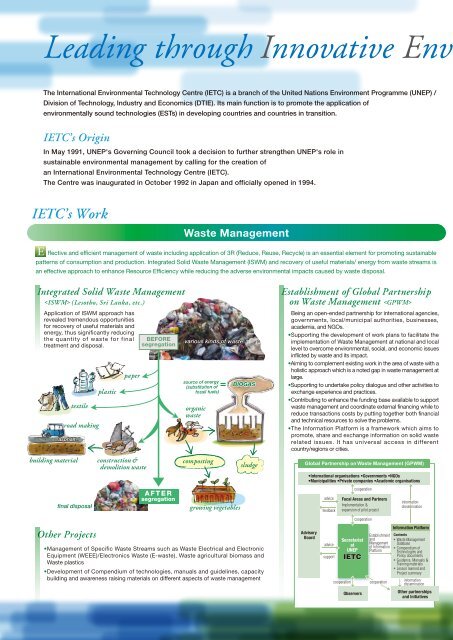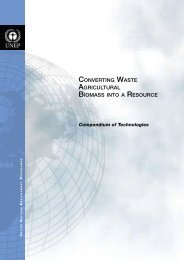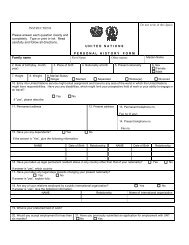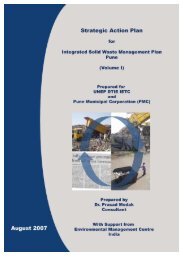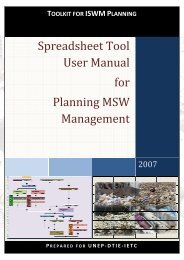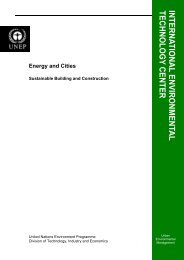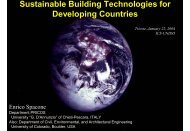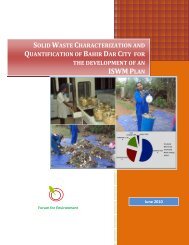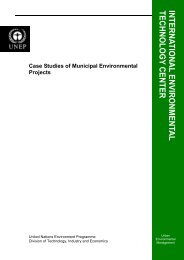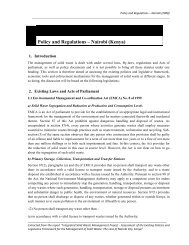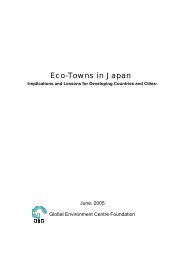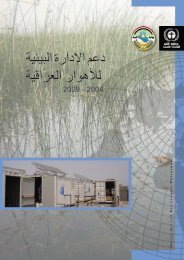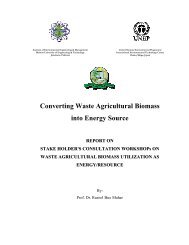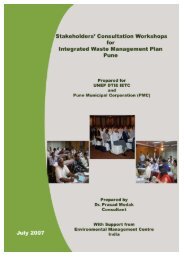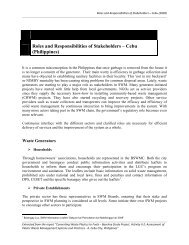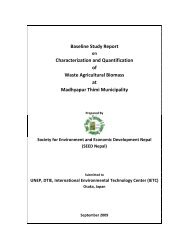IETC Brochure - International Environmental Technology Centre
IETC Brochure - International Environmental Technology Centre
IETC Brochure - International Environmental Technology Centre
You also want an ePaper? Increase the reach of your titles
YUMPU automatically turns print PDFs into web optimized ePapers that Google loves.
Leading through Innovative Env<br />
<strong>IETC</strong>’s Origin<br />
<strong>IETC</strong>’s Work<br />
E<br />
The <strong>International</strong> <strong>Environmental</strong> <strong>Technology</strong> <strong>Centre</strong> (<strong>IETC</strong>) is a branch of the United Nations Environment Programme (UNEP) /<br />
Division of <strong>Technology</strong>, Industry and Economics (DTIE). Its main function is to promote the application of<br />
environmentally sound technologies (ESTs) in developing countries and countries in transition.<br />
In May 1991, UNEP's Governing Council took a decision to further strengthen UNEP's role in<br />
sustainable environmental management by calling for the creation of<br />
an <strong>International</strong> <strong>Environmental</strong> <strong>Technology</strong> <strong>Centre</strong> (<strong>IETC</strong>).<br />
The <strong>Centre</strong> was inaugurated in October 1992 in Japan and officially opened in 1994.<br />
Waste Management<br />
ffective and efficient management of waste including application of 3R (Reduce, Reuse, Recycle) is an essential element for promoting sustainable<br />
patterns of consumption and production. Integrated Solid Waste Management (ISWM) and recovery of useful materials/ energy from waste streams is<br />
an effective approach to enhance Resource Efficiency while reducing the adverse environmental impacts caused by waste disposal.<br />
Integrated Solid Waste Management<br />
(Lesotho, Sri Lanka, etc.)<br />
Application of ISWM approach has<br />
revealed tremendous opportunities<br />
for recovery of useful materials and<br />
energy, thus significantly reducing<br />
the quantity of waste for final<br />
treatment and disposal.<br />
asphalt<br />
building material<br />
textile<br />
road making<br />
final disposal<br />
plastic<br />
paper<br />
construction &<br />
demolition waste<br />
BEFORE<br />
segregation<br />
AFTER<br />
segregation<br />
various kinds of waste<br />
source of energy<br />
(substitution of<br />
fossil fuels)<br />
organic<br />
waste<br />
composting<br />
=<br />
growing vegetables<br />
BIOGAS<br />
sludge<br />
Establishment of Global Partnership<br />
on Waste Management <br />
Being an open-ended partnership for international agencies,<br />
governments, local/municipal authorities, businesses,<br />
academia, and NGOs.<br />
•Supporting the development of work plans to facilitate the<br />
implementation of Waste Management at national and local<br />
level to overcome environmental, social, and economic issues<br />
inflicted by waste and its impact.<br />
•Aiming to complement existing work in the area of waste with a<br />
holistic approach which is a noted gap in waste management at<br />
large.<br />
•Supporting to undertake policy dialogue and other activities to<br />
exchange experience and practices.<br />
•Contributing to enhance the funding base available to support<br />
waste management and coordinate external financing while to<br />
reduce transactions costs by putting together both financial<br />
and technical resources to solve the problems.<br />
•The Information Platform is a framework which aims to<br />
promote, share and exchange information on solid waste<br />
related issues. It has universal access in different<br />
country/regions or cities.<br />
Global Partnership on Waste Management (GPWM)<br />
•<strong>International</strong> organisations •Governments •NGOs<br />
•Municipalities •Private companies •Academic organisations<br />
advice<br />
feedback<br />
cooperation<br />
Focal Areas and Partners<br />
Implementation &<br />
expansion of pilot project<br />
information<br />
dissemination<br />
Other Projects<br />
•Management of Specific Waste Streams such as Waste Electrical and Electronic<br />
Equipment (WEEE)/Electronics Waste (E-waste), Waste agricultural biomass and<br />
Waste plastics<br />
•Development of Compendium of technologies, manuals and guidelines, capacity<br />
building and awareness raising materials on different aspects of waste management<br />
Advisory<br />
Board<br />
advice<br />
support<br />
Secretariat<br />
at<br />
UNEP<br />
<strong>IETC</strong><br />
cooperation<br />
Observers<br />
cooperation<br />
Establishment<br />
and<br />
Management<br />
of Information<br />
Platform<br />
cooperation<br />
Information Platform<br />
Contents<br />
• Waste Management<br />
Database<br />
• Compendium of<br />
Technologies and<br />
Policy documents<br />
• Guidance, Manuals &<br />
Training materials<br />
• Lesson learned and<br />
Project summary<br />
information<br />
dissemination<br />
Other partnerships<br />
and Initiatives


